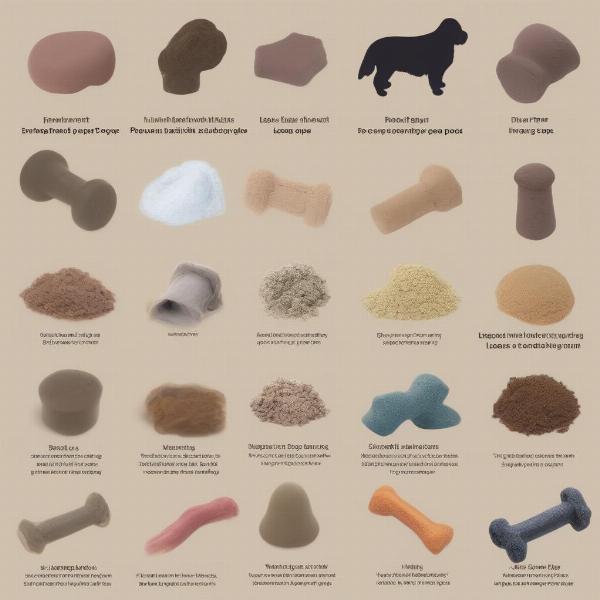Choosing the right dog food can significantly impact your furry friend’s digestive health, including the frequency and consistency of their poop. If you’re tired of cleaning up soft stools or excessive amounts of dog waste, you might be wondering if there’s a dog food for less poop. The good news is that dietary adjustments can often make a big difference. This article will guide you through the factors contributing to excessive poop and how to choose the best dog food for firmer stools and less frequent bowel movements.
Understanding the Factors Affecting Poop Production
Several factors influence the amount your dog poops, including diet, age, breed, activity level, and underlying health conditions. A dog’s diet plays a crucial role. Low-quality dog food often contains fillers and indigestible ingredients that contribute to increased stool volume. These fillers bulk up the food but offer little nutritional value, resulting in more waste. Conversely, high-quality dog food with highly digestible ingredients is absorbed more efficiently, leading to less poop.
Key Ingredients to Look for in Dog Food for Less Poop
When searching for dog food to reduce poop volume, focus on high-quality ingredients. Look for:
- Highly Digestible Protein Sources: Chicken, fish, lamb, and beef are excellent protein sources that are easily broken down and absorbed by the digestive system.
- Healthy Fats: Moderate amounts of healthy fats, like omega-3 and omega-6 fatty acids, support healthy digestion and contribute to firmer stools.
- Fiber: The right amount of fiber can regulate bowel movements. Look for soluble fiber sources like beet pulp and prebiotics, which promote gut health and improve stool consistency.
- Limited Fillers: Avoid foods with excessive fillers like corn, wheat, and soy, as these can contribute to larger, softer stools.
Choosing the Right Dog Food Based on Breed and Age
Different breeds and life stages have different nutritional needs. Puppies, for example, require more calories and nutrients for growth, while senior dogs may need a diet that’s easier to digest. Consult your veterinarian for recommendations specific to your dog’s breed, age, and activity level. They can help you choose a dog food that supports optimal digestion and reduces poop output.
Transitioning to a New Dog Food
When switching to a new dog food, do it gradually to avoid upsetting your dog’s stomach. Start by mixing a small amount of the new food with their current food, gradually increasing the proportion of new food over several days. This allows their digestive system to adjust to the change and minimizes the risk of digestive upset.
Addressing Other Potential Causes of Excessive Poop
While diet is a major factor, excessive poop can also be a sign of underlying health issues, such as parasites, food allergies, or inflammatory bowel disease. If you notice a sudden change in your dog’s bowel movements or other concerning symptoms, consult your veterinarian. They can diagnose any potential problems and recommend appropriate treatment.
 Dog Poop Health Check
Dog Poop Health Check
Conclusion
Choosing the right dog food can significantly reduce the amount your dog poops, making cleanup easier and improving their overall digestive health. Look for high-quality ingredients, avoid excessive fillers, and consult your veterinarian for personalized recommendations. By making informed choices, you can help your furry friend enjoy a healthier digestive system and firmer, less frequent stools.
FAQ
- How long does it take to see a difference in poop volume after changing dog food? It can take a few days to a week for your dog’s digestive system to adjust to a new food.
- What if my dog continues to have excessive poop despite dietary changes? Consult your veterinarian to rule out any underlying health problems.
- Are grain-free dog foods always better for reducing poop volume? Not necessarily. While some dogs benefit from grain-free diets, others may not. Focus on high-quality ingredients, regardless of grain content.
- Can too much fiber cause constipation in dogs? Yes, excessive fiber can lead to constipation. Follow the recommended feeding guidelines on the dog food label.
- Is it normal for my dog’s poop to change color with a new food? Slight color changes can be normal. However, significant or concerning changes should be discussed with your vet.
- What are some signs of digestive upset in dogs? Vomiting, diarrhea, loss of appetite, and lethargy can all indicate digestive problems.
- Are there any supplements that can help with firming up dog poop? Probiotics and digestive enzymes can sometimes be helpful. Consult your veterinarian before giving your dog any supplements.
ILM Dog is your trusted partner in providing comprehensive dog care resources. We offer expert advice on dog breeds, health and medical care, training, nutrition, grooming, and much more. Whether you are a new dog owner or a seasoned enthusiast, ILM Dog has the information you need to ensure your furry friend thrives. Contact us today at [email protected] or +44 20-3965-8624 to learn more. Visit us at ILM Dog for all your dog care needs.